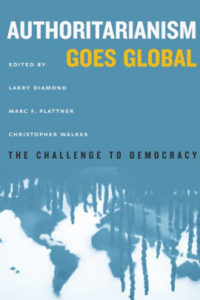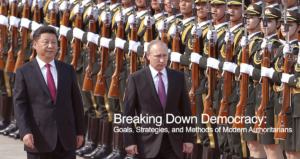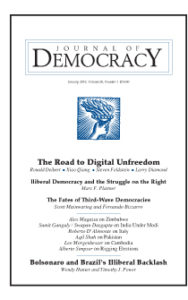The competition of democracy versus dictatorship is to a degree a contest of narratives, argues Richard Fontaine, President of the Center for a New American Security.
 “Beijing and others peddle a seemingly attractive story: that fractious, paralyzed democracies simply can’t muster the will to deliver the goods their people want. Better, they suggest, to embrace an effective, tech-fueled autocracy that can move nimbly to pursue national interests and spread prosperity,” he writes for The Atlantic. “Even recently, this line of argument would have been seen by the vast majority of people as obviously wrong, and until recently polls showed that majorities in virtually every region of the world favored democracy. But liberal democracies continue to create unfortunate grist for the mill.”
“Beijing and others peddle a seemingly attractive story: that fractious, paralyzed democracies simply can’t muster the will to deliver the goods their people want. Better, they suggest, to embrace an effective, tech-fueled autocracy that can move nimbly to pursue national interests and spread prosperity,” he writes for The Atlantic. “Even recently, this line of argument would have been seen by the vast majority of people as obviously wrong, and until recently polls showed that majorities in virtually every region of the world favored democracy. But liberal democracies continue to create unfortunate grist for the mill.”
With the US absent from the World Economic Forum in Davos, it will be much easier for China to make its case for technocratic authoritarianism unchallenged, the FT’s Gideon Rachman observes.
 Democracies are fighting for their lives, argues analyst Joergen Oerstroem Moeller. They face at least nine major challenges, including authoritarian resurgence, he writes for The National Interest.
Democracies are fighting for their lives, argues analyst Joergen Oerstroem Moeller. They face at least nine major challenges, including authoritarian resurgence, he writes for The National Interest.
The key intellectual author of the much-needed 2017 reboot of America’s National Security Strategy, Nadia Schadlow, advanced a wise and energetic strategy for a new era of great power competition with Russia and China, notes Stanford University’s Larry Diamond, co-editor of The Journal of Democracy. It pronounced a posture of “principled realism,” acknowledging “the central role of power in international politics,” while celebrating and clearly stating the principles we must use power to defend: “individual liberty, the rule of law, a democratic system of government, tolerance, and opportunity for all.”
 Those are indeed the values that distinguish and unite Americans, and that undergird the alliances that have produced the longest period of peace with freedom and prosperity in modern world history, he writes for The American Interest.
Those are indeed the values that distinguish and unite Americans, and that undergird the alliances that have produced the longest period of peace with freedom and prosperity in modern world history, he writes for The American Interest.
Initiatives to advance democratic institutions and values feature strongly in the new Department of State, Foreign Operations, and Related Programs Appropriations Act.
The Act provides $180,000,000 for the National Endowment for Democracy (above), of which $117,500,000 “shall be allocated in the traditional and customary manner, including for the core institutes,” according to an explanatory statement:
A total of $62,500,000 is provided for democracy programs, as well as for the next phase of the NED’s mid- to long-term strategic approach and response to immediate and unanticipated challenges or opportunities for the promotion of democracy abroad…The bill includes $10,000,000 for the promotion of human rights in North Korea, of which $6,000,000 is under the National Endowment for Democracy and $4,000,000 is under Economic Support Fund to be administered by DRL.







